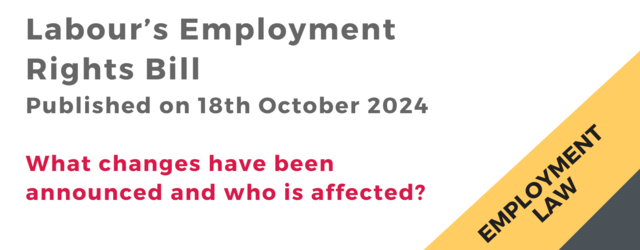
Work Christmas Parties: Employment Law Tips for Employers
Planning a work Christmas party? Here, our Banner Jones Employment Law experts in Sheffield, Chesterfield and Mansfield give you essential tips to avoid legal pitfalls at the Christmas party and protect your business.

Business First Magazine - Autumn/Winter 2025
Check out our Autumn/Winter 2025 Business First Magazine.

Neurodivergence in the workplace - Legal Insights and Practical Steps for Employers
As diagnoses of ADHD, autism and other forms of neurodivergence surge - particularly among younger generations - the challenge for employers is no longer awareness, but action. From legal obligations under the Equality Act to the cultural shift in how we understand difference, the workplace is being rewired.

The Redundancy Process – a guide for small businesses
As financial pressures mount for small businesses across the UK, it has become increasingly important to proactively assess and refine redundancy processes.

Why the consultation period matters when making redundancies
Most business owners and decision makers will grapple with the prospects of having to let people go, and the subsequent redundancy process, at some point during their career.
While the decision itself might be tough, it’s absolutely vital that the process is handled correctly, or employers could find themselves facing legal action.

Employment Law Changes from April 2025 – what do employers need to know?
As part of the government’s pledge to deliver on its promise to Make Work Pay, we will see various statutory payment rate changes from April 2025 as well as an increase to the minimum wage and Neonatal Care Leave becoming a day 1 right.

What are the proposed changes to the Employment Rights Bill?
The UK Government's consultation on the Employment Rights Bill has culminated in several significant amendments aimed at enhancing workers' rights while addressing concerns from businesses and other stakeholders. Initiated in October 2024, the consultation sought feedback on various aspects of the proposed legislation, leading to a series of revisions being published at the beginning of March 2025.

Neonatal Leave becomes a Day 1 right
The Department for Business and Trade confirmed that a day one right to neonatal leave for working families with babies in neonatal care will be introduced from 6 April 2025.

Domestic Abuse – What can employers do to support employees?
Domestic abuse is alarmingly prevalent in the UK. Employers should consider the impact of domestic abuse on employees as part of the duty of care and put procedures in place to support them.

Employment Law Changes in 2024 and What Employers Can Expect for 2025
The UK employment law landscape has undergone significant changes in 2024, and more updates are on the horizon for 2025 and beyond. These reforms impact employers, demanding careful consideration by them to ensure they are legally compliant and ensuring they are following best practice.

Business First Magazine - Autumn/Winter 2024
Welcome to the Autumn/Winter edition of Business First Magazine.

Labour’s Employment Rights Bill: What changes have been announced and who is affected?
The Labour government’s new Employment Rights Bill (published on 18th October 2024) introduces significant changes that aim to improve job security, expand worker protections, and increase flexibility for millions of employees across the UK. Katie Ash, Head of Employment Law at Banner Jones, breaks down some of the key changes and explains who will be affected.

Updates to Sexual Harassment Laws – is your business ready?
As of 26 October 2024, every employer has a legal duty to take proactive measures to prevent sexual harassment in the workplace. This change in the law comes at a time where sexual harassment claims against well-known TV presenters and businessmen are dominating the headlines.

Fire and Rehire Laws – a timely reminder
A recent Supreme Court decision against Tesco serves as an important reminder of the risks of employers using ‘fire and rehire’ to impose changes to terms and conditions and how this should only be used as a last resort.

Navigating the recent changes in UK Employment Laws - April 2024
For HR managers and businesses alike, keeping abreast of Employment Law changes isn't just advisable—it's imperative. Here, Katie Ash, Head of Employment Law summarises some recent regulation changes which came into effect in April 2024.

Improved Redundancy Protection for Maternity Leave
New Regulations came into force on 6 April 2024 in England and Wales to give pregnant employees and those on maternity leave or family-related leave better protection from redundancy.

How to calculate holiday pay in 2024: an update on legislative changes
For many businesses, calculating holiday pay is a straight-forward process. Employers are, within the parameters of the law, able to dictate how many annual leave days or hours a staff member is entitled to.

What is Carer's Leave?
Carer's Leave is where employees apply to be absent from work to provide or arrange care for a dependant with a long-term care need.

Changes to statutory Paternity Leave come into force
The Paternity Leave (Amendment) Regulations 2024 have now come into force, bringing with them changes which see fathers or partners of children born or adopted after 6th April 2024 being able to take their paternity leave entitlement in 2 blocks of one week within the first year of the birth or adoption of their child.

Business First Magazine - Spring 2024
Welcome to the Spring 24 edition of our Business First magazine.

Positive Action not Positive Discrimination
People often talk about how certain groups are under-represented within workforces, but what steps can an employer take to redress this? Head of Employment Law at Banner Jones Solicitors, Katie Ash, discusses how employers can use a Positive Action approach to eliminate or reduce discrimination and help these groups access employment or training as outlined in the Equality Act 2010.

An Office Romance – Should a relationship at work be disclosed?
Disclosing a relationship at work depends on various factors, including company policies, the working environment, and the nature of the relationship. Sara Patel, Employment Law Specialist at Banner Jones, explains some considerations to help employees and employers navigate what can sometimes be a complex situation.

Innocent banter or workplace discrimination?
Workplace banter is driving a surge in claims against employers with research showing that 66 claimes relating to banter were heard in employment tribunals in 2022.

Minimum wage changes – is your business ready?
The Government has announced new National Minimum Wage rates for 2025, including the National Living Wage. The new rates which will come into force from 1 April 2025 - is your business ready?

Employment Law - Changes employers need to be aware of
As we enter 2024, we’ve been reflecting on some of the significant changes in employment law we have seen over the course of 2023 which employers need to be aware of. These include amendments to the flexible working regime, further deliberations about employment status by the Supreme Court and considerable changes to the calculation of holiday pay. 2024 looks set to be a big year for change in employment law, so here we have done a roundup of key developments in 2023 and have highlighted the ‘ones to watch’ in 2024.

